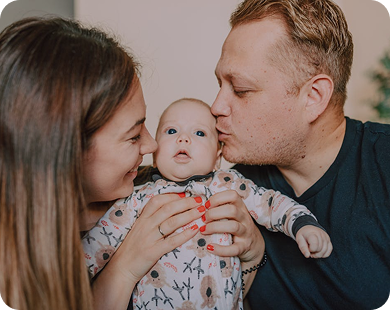Understanding real IVF success rates by age can feel overwhelming, but knowing what to expect helps you make informed decisions about your fertility journey. While success rates naturally decline with age, modern fertility treatments offer hope and realistic pathways to parenthood at every stage of life.
What Are Realistic IVF Success Rates by Age?
When you're considering fertility treatment, you want honest answers about your chances of success. The reality is that age significantly impacts fertility outcomes, but understanding these numbers helps you plan your treatment approach more effectively.
Success rates vary depending on how you measure them. Some clinics report pregnancy rates per cycle, while others focus on live birth rates. At Avida Fertility, we believe in transparency and always discuss live birth rates because that's what matters most to you.
| Age Group | Live Birth Rate per IVF Cycle | Miscarriage Rate | Key Considerations |
|---|---|---|---|
| Under 35 | 40-50% | 15-20% | Highest success rates, best egg quality |
| 35-37 | 35-40% | 20-25% | Good success rates, slight decline begins |
| 38-40 | 25-35% | 25-35% | Noticeable decline, may need multiple cycles |
| 41-42 | 15-25% | 35-45% | Consider donor eggs for better outcomes |
| 43-44 | 5-15% | 45-55% | Donor eggs often recommended |
| 45+ | 1-5% | 55%+ | Donor eggs typically necessary |
These numbers represent averages across multiple studies and clinics. Your individual circumstances, including overall health, specific fertility diagnosis, and treatment protocol, can significantly influence your personal success rates.
Why Age Affects Fertility Success Rates
Understanding why age impacts fertility helps you grasp what these statistics mean for your situation. The primary factor isn't just the number of eggs you have, but their quality.
As you age, several changes occur in your reproductive system. Your eggs accumulate genetic damage over time, leading to higher rates of chromosomal abnormalities. This results in lower fertilization rates, poorer embryo quality, and increased miscarriage risk.
Your ovarian reserve also declines with age. This means fewer eggs are available for retrieval during IVF cycles. However, it's important to remember that you only need one healthy embryo to achieve pregnancy.
Factors Beyond Age That Impact Success Rates
While age is the most significant predictor of IVF success, other factors play crucial roles in your treatment outcomes. Understanding these can help you optimize your chances of success.
| Factor | Impact on Success | What You Can Do |
|---|---|---|
| Body Mass Index (BMI) | BMI over 30 reduces success by 10-15% | Achieve healthy weight before treatment |
| Smoking | Reduces success rates by up to 50% | Quit smoking at least 3 months before treatment |
| Male Factor | Affects 40% of fertility cases | Comprehensive male fertility evaluation |
| Previous Pregnancies | Prior pregnancy increases success rates | Discuss history with your fertility specialist |
| Specific Diagnosis | Varies by condition | Targeted treatment for underlying causes |
Your lifestyle choices significantly impact treatment success. Maintaining a healthy lifestyle through proper nutrition, regular exercise, stress management, and avoiding harmful substances can improve your outcomes regardless of age.
Treatment Options by Age Group
Different age groups benefit from different treatment approaches. Your fertility specialist will recommend the most appropriate strategy based on your age, diagnosis, and personal circumstances.
Women Under 35
If you're under 35, you have the highest chance of success with your own eggs. Most fertility specialists recommend starting with less invasive treatments if appropriate for your diagnosis.
Treatment progression typically follows this path: lifestyle modifications and timed intercourse, intrauterine insemination (IUI), then IVF if needed. Many women in this age group achieve pregnancy within the first few treatment cycles.
Women 35-40
This age range represents a transitional period where success rates begin declining but remain encouraging. You may benefit from more aggressive treatment approaches to maximize your chances while time is still on your side.
Your doctor might recommend moving to IVF sooner rather than spending extensive time on less effective treatments. Preimplantation genetic testing (PGT) becomes more valuable in this age group to identify the healthiest embryos.
Women Over 40
If you're over 40, your treatment plan requires careful consideration of success rates with your own eggs versus donor egg options. While pregnancy with your own eggs remains possible, success rates are lower and miscarriage rates higher.
Many women in this age group benefit from aggressive ovarian stimulation protocols and may need multiple IVF cycles to achieve success. Your fertility specialist will discuss whether pursuing treatment with your own eggs aligns with your goals and timeline.
Understanding Cumulative Success Rates
Single-cycle success rates don't tell the complete story. Many patients achieve pregnancy after multiple treatment cycles, which is why cumulative success rates provide a more comprehensive picture.
| Age Group | 1 Cycle | 2 Cycles | 3 Cycles | 4+ Cycles |
|---|---|---|---|---|
| Under 35 | 45% | 65% | 75% | 80% |
| 35-37 | 38% | 58% | 68% | 75% |
| 38-40 | 30% | 48% | 58% | 65% |
| 41-42 | 20% | 35% | 45% | 52% |
| 43+ | 10% | 18% | 25% | 30% |
These cumulative rates show that persistence often pays off. However, it's important to balance hope with realistic expectations and consider alternative approaches like donor eggs when appropriate.
When to Consider Donor Eggs
Donor eggs can dramatically improve success rates for women with age-related fertility decline. This option isn't giving up on your dreams—it's choosing a path with higher success rates and lower miscarriage risk.
Success rates with donor eggs remain consistently high regardless of the recipient's age, typically ranging from 50-70% per cycle. The key factors become the donor's age and health, along with your uterine environment.
Consider donor eggs if you're over 42, have had multiple failed IVF cycles with your own eggs, or have been diagnosed with severely diminished ovarian reserve. The emotional transition to donor eggs is significant, but many patients find peace and success with this option.
The Role of Egg Freezing in Success Rates
If you're not ready for pregnancy now but want to preserve your fertility potential, egg freezing can be an excellent option. The success rates of frozen eggs depend primarily on your age when you freeze them, not when you use them.
Eggs frozen at age 30 will have the same success potential when you're 40 as they did when you were 30. This technology allows you to essentially pause your biological clock and maintain higher success rates for future use.
Improving Your Personal Success Rates
While you can't change your age, you can optimize other factors that influence treatment success. Small improvements in multiple areas can significantly impact your overall chances.
Improving egg quality through proper nutrition, supplements, and lifestyle changes can enhance your outcomes. Focus on antioxidant-rich foods, maintain a healthy weight, manage stress levels, and ensure adequate sleep.
Your partner's health matters too. Sperm quality improvements can boost fertilization rates and embryo quality, contributing to better overall success rates.
Choosing the Right Clinic Matters
Not all fertility clinics achieve the same success rates. When evaluating clinics, look beyond marketing claims and examine their actual outcomes data. Choosing the right fertility clinic can significantly impact your treatment success.
At Avida Fertility, we maintain transparent reporting of our success rates and provide personalized treatment plans based on your unique circumstances. Our advanced laboratory techniques and experienced team help optimize outcomes for patients of all ages.
Financial Considerations and Treatment Planning
Understanding success rates helps you make informed financial decisions about your fertility treatment. Consider the cost per successful pregnancy rather than just the cost per cycle when evaluating treatment options.
While treatment costs are significant, investing in higher-quality care or more advanced techniques may improve your chances of success and reduce the total number of cycles needed.
Emotional Preparation for Your Journey
Knowing realistic success rates helps you prepare emotionally for your fertility journey. It's natural to hope for the best while preparing for various outcomes.
Emotional support throughout treatment is crucial. Consider counseling, support groups, or other resources to help you navigate the emotional aspects of fertility treatment.
Frequently Asked Questions
What's the difference between pregnancy rates and live birth rates?
Pregnancy rates include all positive pregnancy tests, while live birth rates only count babies born alive after 20 weeks gestation. Live birth rates are lower but more meaningful since they represent your actual chance of taking home a baby.
How many IVF cycles should I try before considering donor eggs?
This depends on your age and specific circumstances. Generally, if you're under 40, most doctors recommend 3-4 cycles with your own eggs. Over 40, you might consider donor eggs after 1-2 failed cycles, especially if egg quality is poor.
Do success rates vary significantly between clinics?
Yes, success rates can vary by 10-20% between clinics due to differences in laboratory quality, treatment protocols, and patient selection. Research clinics carefully and ask about their specific success rates for your age group and diagnosis.
Can lifestyle changes really improve my success rates?
Absolutely. Studies show that maintaining a healthy weight, not smoking, limiting alcohol, managing stress, and taking appropriate supplements can improve success rates by 10-30% depending on your starting point.
What if my AMH levels are low for my age?
Low AMH indicates diminished ovarian reserve, which may reduce your success rates compared to other women your age. However, AMH doesn't predict egg quality, so pregnancy is still possible. Your doctor may recommend more aggressive treatment protocols.
Moving Forward with Realistic Expectations
Understanding real success rates by age empowers you to make informed decisions about your fertility treatment. While the numbers may seem daunting, remember that statistics represent averages—your individual journey may be different.
The key is working with experienced fertility specialists who can provide personalized guidance based on your unique situation. Modern fertility treatments offer hope and realistic pathways to parenthood, even when the odds seem challenging.
Success in fertility treatment isn't just about achieving pregnancy—it's about finding the path that works best for you, whether that involves your own eggs, donor eggs, or alternative approaches to building your family.
Considering IVF treatment? Avida Fertility is here to support and guide you on your fertility journey. Reach out today for a personalized consultation and take the first step towards building your family with confidence.






.png)







.svg)
.svg)
